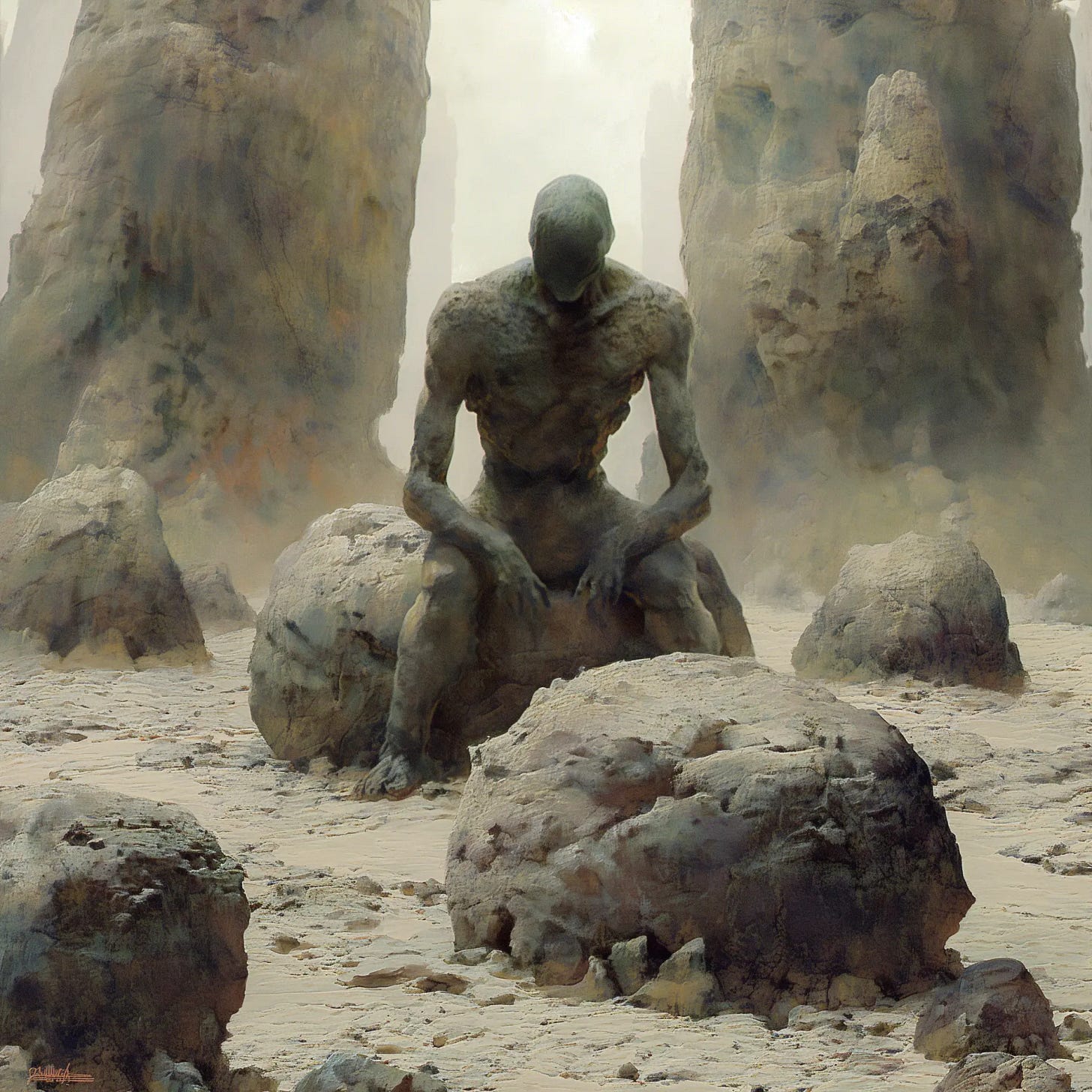Built to Last
Flash fiction, 600 words. The sands of time are in freefall for me, I can't believe July is almost over.
Look on my works, ye mighty, and despair.
These words rang in the cavity where the golem’s soul would be, if he’d had one. All his work, all his hard work. No great army had done this, no relentless assault by Time.
The citizens had done this themselves.
He had built these columns a thousand years ago. Toppled. These plinths so painstakingly carved? Broken apart. The smooth stones he had cut and polished so exactingly for their bare feet to walk upon? Pried up and distributed to any home that wanted them.
As for himself, the word Build which had made him, pressed into his tongue, had eroded shortly after his work was done. He’d been content to sit in the shadow of the arcade, just one of so many other statues – which he’d also made – as the people of forty generations entered the temple of Jur-mat, removed their shoes, and walked across the long, perfect floor toward the six-headed, six tailed dragon god to worship in fear and expectation.
The pleading shouts he’d heard, the cries of the sacrifices. How once the perfect stones ran with blood.
He did not know what had caused the change. Only that fewer and fewer women accompanied their masters. Then they no longer brought their children. Then the ones he knew to be slaves came without their collars. They did not kneel at the altar to be taken, but instead yanked at the chains of bulls. One bull filled the basin which had once received twelve men or fifteen women or twenty children. One bull, and that generation was content.
Then, for a time, no one came.
Sand crept across the floor, worrying the polish. The pitch in the braziers oozed and reeked, unlit. The altar lay untouched, gathering dust. But it was all still good, perfectly good. Nothing a contingent of slaves couldn’t have cleaned in a day’s time.
But the next to arrive had been soldiers, not slaves. Their armor was strange. The men who accompanied them were strange. The soldiers had stood at the door, refusing entry to anyone who might try to stop the men. But no one did.
The men were not so strange, now that the golem looked. He recognized the bloodline of the priests in them. Only their clothes were strange. Only their actions were strange. They tied ropes to the towering form of Jur-mat and built scaffolding around it. Then they took sledgehammers and chisels and destroyed it. Chunks of rock fell into the basin. The last sacrifice to Jur-mat was itself.
After that, the pace at which they destroyed the temple had been leisurely. One statue here, one arcade frieze there. Stonecutters and masons – he recognized their tools but not the softness of their features – came in and began removing the fine steps. They pried up the floors. They disassembled the plinths that were decorated with flowers and animals but not those which depicted the Nine Acts of Jur-mat. Those they destroyed.
And so it went. The last man to come to the temple had been short and bespectacled and covered in tweed, a far cry from the massive, naked, broad-shouldered warriors who’d inaugurated the temple by cutting their cheeks.
He’d worn the symbol of a strange god hanging from a chain of silver. This he’d clutched as though expecting trouble. All that met him was silence, baked earth, broken pillars, and sunlight. He’d looked around without ever noticing the golem in the shadow of a pillar, and sighed.
“Oh well,” he’d said, and walked away.
Author’s note: The opening line is, of course, from “Ozymandias” by Percy Shelley, not original to my bemused golem.



Nice story, man. And yes, time is flying.
Very moody narrative, fits in a Cthulhu-esk story, involving strange things, though I have noticed like this the other stories on this prompt seem to be more set pieces and not really fleshed out narratives.